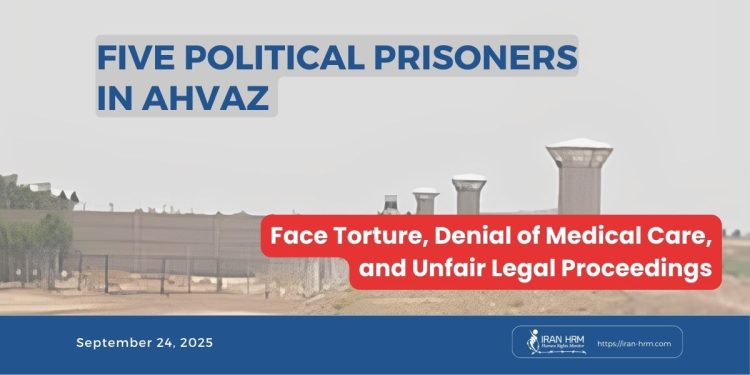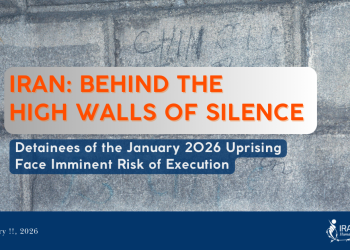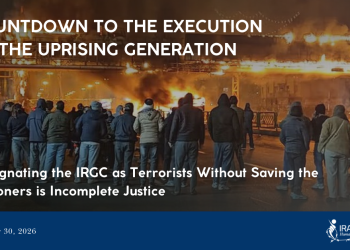Five political prisoners held in Sheiban Prison in Ahvaz—Mokhtar Alboushokeh, Mostafa Helichi, Reza Hezbavi, Abbas Saeedi, and Amer Machasebeh—have reportedly been subjected to torture, medical neglect, and prolonged legal uncertainty. On September 22, 2025, they participated in a videoconference hearing to present their final defense before the Revolutionary Court on the charge of “membership in an insurgent group.” The case now awaits a final verdict.
Arbitrary Arrests and Systematic Torture
According to human rights sources, Helichi and Hezbavi, both cultural activists and poets, were arrested in December 2024 by Iran’s Public Security Police (PAVA), a branch of the national police force (FARAJA). They were detained for a month in a PAVA facility, where they were allegedly subjected to repeated physical and psychological abuse, including beatings and suspension torture.
One week later, the other three detainees—Alboushokeh, Saeedi, and Machasebeh—were arrested and transferred to the same facility. Reports indicate they were also tortured, including while restrained, and denied basic legal rights during their interrogations.
Denial of Medical Care and Inhumane Conditions
The five prisoners are reportedly held in unsanitary conditions with inadequate access to medical treatment. Mokhtar Alboushokeh, in particular, has suffered from a hernia for years. Following recent torture, his condition has reportedly worsened due to infection and lack of care.
Despite repeated appeals from his family for medical furlough, judicial and security authorities have refused to grant him access to external medical services. Other detainees are similarly denied essential healthcare, heightening concerns for their physical and mental well-being.
Background on Individual Cases
Mokhtar Alboushokeh has been imprisoned since March 2011 without any furlough. Previously sentenced to life imprisonment on vague national security charges, he was recently transferred to a PAVA detention center in December 2024 after being accused of communicating with former political prisoners. During his detention, he was reportedly tortured while restrained in stress positions. Upon returning to prison, he began a hunger strike in protest.
Reza Hezbavi, a 36-year-old poet and father of two, was previously detained in November 2011 for attending a funeral of a fellow poet and was sentenced to a short prison term and flogging, later converted to a fine. His recent arrest was again linked to peaceful cultural activity.
Mostafa Helichi is accused of communicating with opposition figures abroad—an allegation commonly used to criminalize activism in Iran. Both he and Hezbavi reportedly endured severe torture during detention, leading to significant health deterioration and multiple hospital visits.
This case highlights the ongoing use of torture, denial of medical care, and fabricated security charges to suppress dissent in Iran, particularly in ethnic minority regions. Rights organizations warn that these patterns reflect a broader policy of systematic repression against civil society actors, in direct violation of Iran’s obligations under international human rights law.







